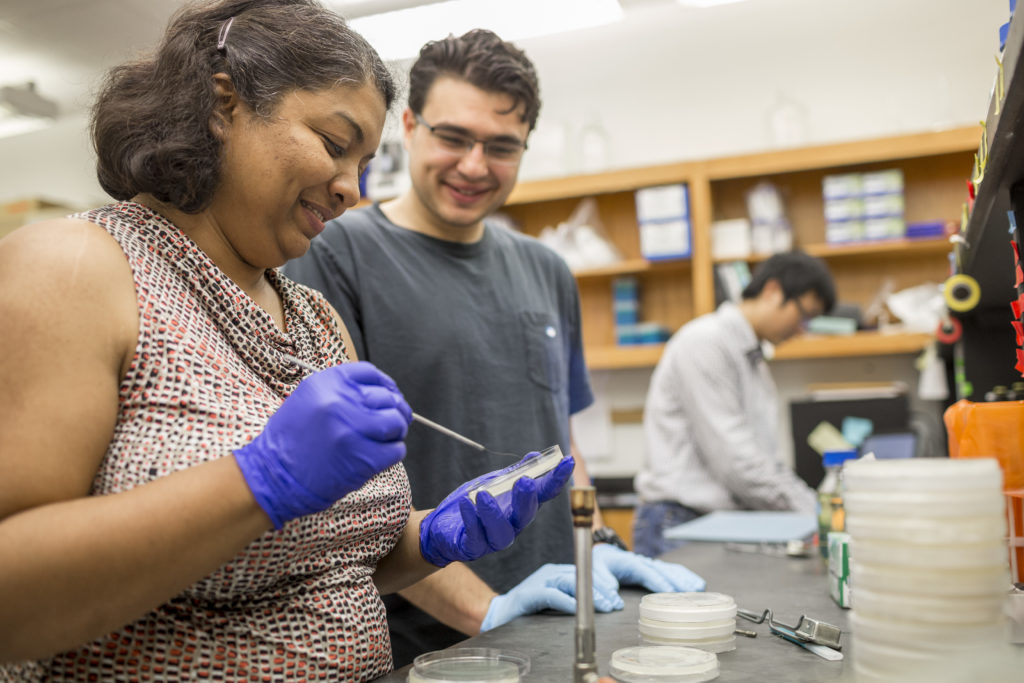
The Office of the Provost is moving forward with promoting the Volunteer Experience, as articulated in goal one of the Strategic Vision. This comprehensive, university-wide approach promotes student well-being inside and outside the classroom. One effort in that approach is establishing academic department Student Success Grants to support the integration of well-being pedagogy in priority, high-enrollment courses.
The first grant awarded in fall 2021 supports the Division of Biology’s Biology Booster Shot project, submitted on behalf of co-applicants, Professor Randall Small and Lecturer Caroline Wienhold. “The Provost’s Office is excited to support the Division of Biology and this effort that will engage with the Volunteer Experience by infusing well-being into the department’s classrooms to enhance student success,” Amber Williams, vice provost for Student Success, said. “This step is the first among many initiatives designed to create the conditions where every student scholar thrives. I’m grateful to the Biology faculty for their commitment to enhancing the undergraduate experience.”
The Biology Booster Shot is a three-pronged approach to improving student success in the 100-level introductory biology courses, specifically BIOL 150 and 160. The project, which is expected to take two years and will serve as a pilot project for future grants, will:
- Enhance learner support programs in collaboration with the Academic Success Center
- Refocus the learning objectives and pedagogical approaches in these courses
- Create a culture of continuous reflection and innovation framed in well-being for faculty and staff
Faculty from BIOL 150 and 160 courses attended a two-day retreat Tuesday, January 11 and Wednesday, January 12 to focus on innovative methods of incorporating well-being and the grant’s outcomes into the classroom. Day one focused on the framework for infusing well-being strategies into the classroom. Faculty were able to share existing practices and brainstorm new ideas under each element of PERMA. Day two centered on equity-based teaching, best practices in policy and assessment, and idea generation, with Dr. Rachel Ellestad attending to share what faculty are doing in engineering fundamentals.
As part of grant, the Division of Biology is working with Teaching & Learning Innovation to develop sustainable professional development and curriculum review processes for faculty. Implementing enhanced ways to onboard and support new instructors will build community among our faculty and ensure ideas and momentum are built upon semester to semester, ultimately contributing to student success. “TLI is thrilled to be working with General Biology on this project,” Virginia Stormer, associate director in TLI, said. “What is so impressive about this group of faculty is how enthusiastic and invested they are in the success of their students. The retreat was a wonderful opportunity for the faculty to learn from each other and to generate ideas to create a consistent and supportive experience for all students in Biology 150 and 160 courses.”
“In our project, we are focusing on both students and faculty, because feeling supported, feeling part of a community, finding meaning in your efforts, and achieving, isn’t something only students need,” Wienhold, also assistant director of Biology Teaching & Learning, said.
In addition, they are collaborating with the Academic Success Center to expand biology students’ tutoring options, namely creating a method for peer tutors to participate during class and form a team with the instructor. This work is meant to create a culture of students seeking academic support and making large classrooms feel more personable and smaller.
“We expect the team-based professional development and curriculum review processes and peer tutor program we develop in general biology courses will serve as a model for the upper-division biology courses and other large-enrollment or team-taught courses,” Small, also director of Biology Teaching & Learning, said.
Dr. Wienhold explained the importance of students’ success in biology, saying UT faculty want students to be informed citizens and critical consumers of data who understand the scientific process. Most of the 7,000 students enrolled annually in general biology are not biology majors and have different interests. “If we can help students find meaning in the content and connection through relationships with their peers, their tutors, and their instructors, we hope that will sustain their interest in biology and push these students to continue to learn and engage with science,” Wienhold said.